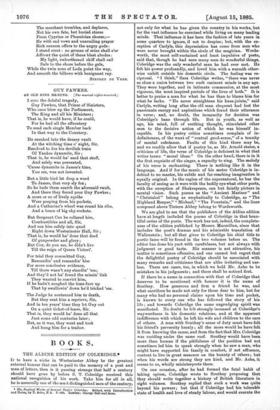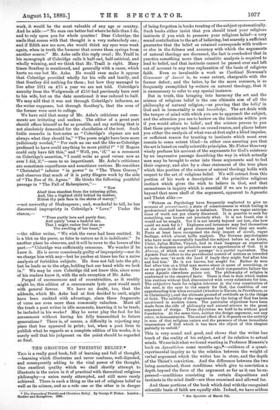BOOKS.
THE ALDINE EDITION OF COLERIDGE.* Is to have a niche in Westminster Abbey be the greatest external honour that can be paid to the memory of a poet and man of letters, then is it passing strange that half a century should have gone by before S. T. Coleridge received this national recognition of his work. Take him for all in all, he is assuredly one of the moat distinguished men of the century,
• The Poetical Works of Samuel Taylor Coleridge. Edited, with Introduction and Notes, by T. Ashe, B.A. 2 cols. London : George Bell and Sons. not only for what he has given the country in his works, but for the vast influence he exercised while living on many leading minds. That influence it has been the fashion of late years in some quarters to ignore, if not to despise ; but, with the ex- ception of Carlyle, this depreciation has come from men who were never brought within the circle of the magician. Words- worth, the most self-sustained and least impulsive of poets, said that, though he had seen many men do wonderful things, Coleridge was the only wonderful man he had ever met. He felt his power profoundly, and loved him with a warmth other- wise unfelt outside his domestic circle. The feeling was re- ciprocal. "I think," Sara Coleridge writes, "there was never so close a union between two such eminent minds in any age. They were together, and in intimate communion, at the most vigorous, the most inspired periods of the lives of both." It is better to praise a man for what he has than to blame him for what he lacks. "He never straightens his knee-joints," said Carlyle, writing long after the old man eloquent had lost the passionate energy and aspirations which found their utterance in verse; and, no doubt, the incapacity for decision was Coleridge's bane through life. But in youth, as well as age, his mind, full of seething thought, stimulated other men to the decisive action of which he was himself in- capable. In his poetry critics sometimes complain of in- definiteness, of the want of "central good-sense," of a tenuity of mental substance. Faults of this kind there may be, and we readily allow that if poetry be, as Mr. Arnold states, a criticism of life, the verse of Coleridge is deficient in what that writer terms "moral ideas." On the other hand, there is in it the first requisite of the singer, a capacity to sing. The melody of his verse is enchanting. There is nothing like it in the language. And if for the music of his metre Coleridge is in- debted to no master, his subtle and far reaching imagination is equally original. In the region of the supernatural, he has the faculty of seeing as it were with the bodily eye what other poets, with the exception of Shakespeare, can but faintly picture in mental vision. Such poems as the "Ancient Mariner" and " Christabel" belong as emphatically to Coleridge, as "The Highland Reaper," " Michael," "The Fountain," and the lines composed above Tintern Abbey belong to Wordsworth.
We are glad to see that the publishers of the Aldine edition have at length included the poems of Coleridge in that beau- tiful series of the poets. The work has not, indeed, the complete- ness of the edition published by Messrs. Macmillan, since that includes the poet's dramas and his admirable translation of Wallenstein ; but all that gives to Coleridge his chief title to poetic fame will be found in the two volumes before us. The editor has done his part with carefulness, but not always with judgment or good taste. His manner is not attractive, his matter is sometimes offensive, and one cannot but regret that the delightful poetry of Coleridge should be associated with many remarks and criticisms that are alike irritating and use- less. There are cases, too, in which we hold Mr. Ashe to be mistaken in his judgments ; and these shall be noticed first.
If there be a name in connection with that of Coleridge that deserves to be mentioned with honour it is the name of Southey. How generous and firm a friend he was, and what sacrifices he made not only for those dear to him, but for many who had no personal claims upon his time and pocket, is known to every one who has followed the story of his life ; and towards Coleridge the same ungrudging spirit was manifested. No doubt he felt strongly incensed at Coleridge's waywardness in his domestic relations, and at the apparent indifference with which he left his wife and children to the care of others. A man with Southey's sense of duty must have felt his friend's perversity keenly ; all the more would he have felt it from knowing the cause, and from the fact that Mrs. Coleridge was residing under the same roof. Southey would have been more than human if the pitifulness of the position had not sometimes led him to speak strongly when he saw a man, who might have supported his family in comfort, if not affluence, content to live in great measure on the bounty of others ; but when his words are strong they are kind, and Mr. Ashe, it seems to us, wholly misinterprets them.
On one occasion, after he had formed the fatal habit of taking opium, Coleridge wrote to Southey proposing that they should write together a history of British literature in eight volumes. Southey replied that such a work was quite beyond his powers ; but that if Coleridge had his tolerable state of health and love of steady labour, and would execute the work, it would be the most valuable of any age or country.
And he adds :—" No man can better feel where he fails than I do, and to rely upon you for whole quartos Dear Coleridge, the smile that comes with that thought is a very melancholy one ; and if Edith saw me now, she would think my eyes were weak again, when in truth the humour that covers them springs from another source." Mr. Ashe calls this reply cruel; Mr. Traill in his monograph of Coleridge calls it half-sad, half-satirical, and wholly winning, and we think that Mr. Traill is right. Many times Southey is mentioned, and generally with a sneer, which hurts no one but Mr. Ashe. He would even make it appear that Coleridge provided wholly for his wife and family, and that Southey did nothing for them ; but how they managed to live after 1811 on £75 a year we are not told. Coleridge's annuity from the Wedgwoods of £150 had previously been sent to his wife, but on the date mentioned it was reduced to half. We may add that it was not through Coleridge's influence, as the writer supposes, but through Southey's, that the sons of the former were sent to college.
We have said that many of Mr. Ashe's criticisms and com- ments are irritating and useless. The editor of a great poet should efface himself as far as possible, and say nothing that is not absolutely demanded for the elucidation of the text. Such futile remarks in foot-notes as " Coleridge's rhymes are not
always what they should be," "The poem might have been more judiciously worded," " For such an ear and the like as Coleridge professed to have could anything be more pitiful P" "If Rogers -could only have felt this," and " Well, yes, 'if,' " as a comment on Coleridge's assertion, " I could write as good verses now as .ever I did, if,"—seem to us impertinent. Mr. Ashe's criticisms
are sometimes superfluous and sometimes curious. He considers " Christabel " inferior " in power" to " The Three Graves," and observes that much of it is petty filagree work by the side .of "The Eve of St. Agnes." He thinks the following youthful passage in " The Fall of Robespierre,"—
" Now Aloof thou standest from the tottering pillar, And, like a frighted child behind its mother, Hidest thy pale face in the skirts of mercy,"
— not unworthy of Shakespeare ; and, wonderful to tell, he has discovered impropriety in Coleridge's "Love." Under the atanza,—
"'Twat; partly love and partly fear,
And partly 'twas a bashful art, That I might rather feel than see The swelling of her heart,"
— the editor writes, " We wish the verse had been omitted. It is a blot on the poem, as false to nature as it is indelicate." In -another place he observes, and it will be news to the lovers of the poet:—" Coleridge was sufficiently sensuous. We wonder if be knew it. He is never consciously guilty of impropriety—nor do we charge him with any—but he pushes at times too far a naive analysis of forbidden subjects. He does not fall into the pit; but he leads us to the edge, holding fast our hand while we look in." We may be sure Coleridge did not know this, since none of his readers know it, with the sole exception of Mr. Ashe.
Purged of excrescences and of eccentricities, as it readily _might be, this edition of a consummate lyric poet would meet with general favour. We have no doubt, too, that the addends, which Mr. Ashe had at first decided to omit, might have been omitted with advantage, since these fragments of verse are even more than commonly valueless. Must all the trash a poet writes in idle moments, knowing it to be trash, be included in his works ? May he never play the fool for his amusement without having his folly transmitted to future generations? There is, of course, a difficulty in rejecting any piece that has appeared in print; but, when a poet lives to publish what he regards as a complete edition of his works, it is surely well that his judgment on the point should be regarded as final.



































 Previous page
Previous page